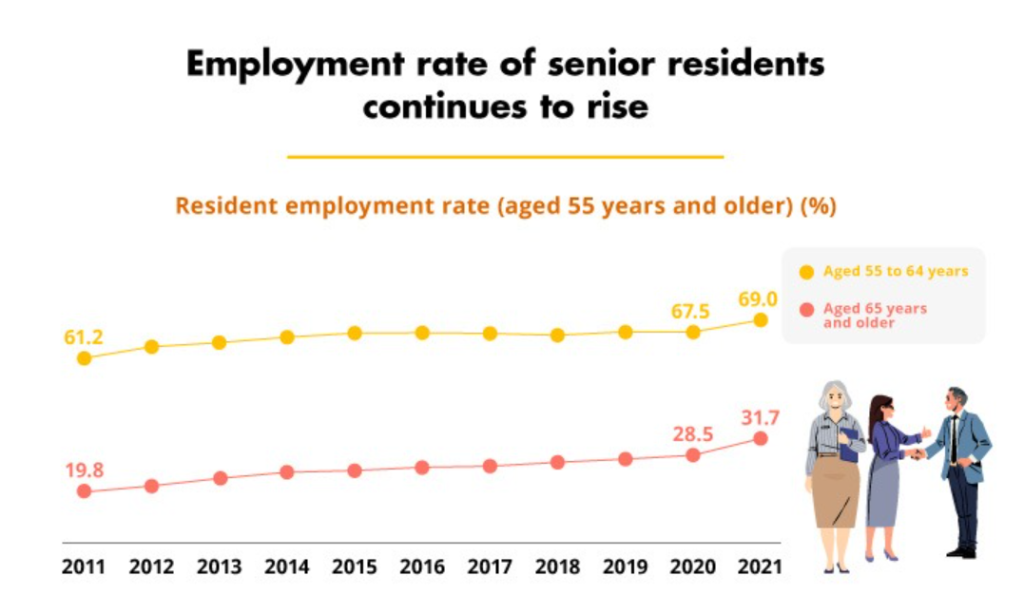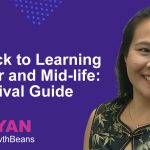The statistics show that Singaporeans are living and staying healthier for longer. At the book launch of ‘Singapore Ageing: Issues and Challenges Ahead‘ in April 2023, Prime Minister (PM) Lee Hsien Loong said: “Our population is not just ageing, but ageing rapidly.
“In 2010, about 1 in 10 Singaporeans were aged 65 and above. A decade later, in 2020, it has risen to about 1 in 6. By 2030, another ten years later, it would be almost 1 in 4 Singaporeans over 65.
“Individuals must embrace ageing positively – you cannot help your hair from growing greyer or sparser, but you can stay open to change, keep learning and remain productive for as long as you can.”
Adding to the point at a dialogue at the National University of Singapore’s (NUS) Institute of Policy Studies (IPS) Singapore Perspectives Conference in early 2023, Deputy Prime Minister (DPM) Lawrence Wong said: “There’s obviously a limit to how long we can work. But we must recognise with rising longevity, with people living longer lifespans, when we do our surveys, the majority of people do want to work longer so long as they are healthy.
“Because a lot of people recognise that the minute they stop working, their health deteriorates very quickly.”
He added that work is more than a source of income and provides dignity and purpose. “There is something fundamental and important about work.”
Wanting or having to work still needs you to plan ahead
As it stands, Singapore’s retirement and re-employment ages will be progressively raised to 65 and 70 by 2030.
Of course, there’s a difference between wanting to work or having to work, with the latter referring to more elderly Singaporeans who continue to stay in the workforce because of the additional income required. Truth be told, retiring is not likely an option for everyone.
Even for those who are able to retire, this may not mean never working again. They may take on jobs with less commuting and stress and move on to roles more aligned with their interests or talents.
Marc Freeman, the author of Encore: Finding Work that Matters in the Second Half of Life, popularised the notion of an encore career, which is a second vocation beginning in the latter half of one’s life, that combines continued income, greater personal meaning and social impact.
These jobs can be in public interest fields, such as education, the environment, health, social services, or non-profit organisations.
Vicky Ang, an assistant outreach manager at the Institute for Financial Literacy, shared with Workipedia by MyCareersFuture as part of Workforce Singapore’s Take Charge of Your Career @ Suntec event in July: “We believe there is no perfect “model” that can address the complex motivational dynamics and market forces that impact retirement planning and adequacy for each generation.
“Current “models” that assumed a rate of steady salary growth (even assuming inflation is not a factor) look vulnerable in today’s context of volatile careers, industry disruptions, and speed of technological innovations.
“In fact, the very concept of earnings stability is at risk. A change of mindset on long-term career and financial plans needs to, and is already happening, and is likely to be more common as people look at retirement differently today compared to earlier generations.
She added: “The earlier one starts taking action, the better his/her chances of being able to build a sufficient inflation-adjusted income, either by starting early on a savings nest egg or putting in place sources of income stability by continued work as part of an encore career.”
Don’t worry; Singapore is moving towards building age-friendly workplaces
Yes, we get it – some older workers have qualms about staying or returning to the workforce as they age due to worries about digitalisation or being labelled “boomers” for their age.
In Singapore, McKinsey-founded independent non-profit company Generation found many misconceptions hiring managers have about job candidates between 45 to 60 years old.
“Individuals who are 45 and older are wrongly perceived to be the least desirable cohort in terms of skills, readiness for training, and ability to fit into an organisation.”
“What was also quite stark was that this perception bias was universal across every country we surveyed,” shared Mona Mourshed, the chief executive of Generation.
But the research also revealed that managers rank these workers the same or higher on job performance than employees a decade younger.
“We believe in the power of work to transform people’s lives. In our work with Generation, we are contributing our most valuable resource—our people—by enabling them to work side-by-side with Generation staff on a wide range of operational and program initiatives,” says Anna Navratil, head of giving back at McKinsey, a global management consulting firm.
“Reskilling mid-career workers is critical to helping businesses and communities achieve more inclusive growth.”

While much’s been said online between different generations of workers having conflicting perspectives, leading to tension at the workplace, the Singapore government has taken steps to nurture age-friendly workplaces.
For example, more than 7,000 companies have adopted the Tripartite Standard on Age-Friendly Workplace Practices as of September 2022, a three-fold increase from March 2020.
The standard specifies desirable age-friendly workplace practices, including treating all workers fairly regardless of age and supporting senior workers in areas such as training and workplace health programmes.
This shows that more employers are taking active steps to be progressive and inclusive. In fact, seniors’ employment rate has been rising faster in recent years to above pre-pandemic levels due to continued efforts to raise their employability.
According to the Ministry of Manpower, more than 5,400 locally-based firms successfully applied for the Senior Worker Early Adopter Grant to implement retirement and re-employment ages above the prevailing statutory ages, which is expected to benefit over 46,000 senior workers.
Similarly, more than 4,300 firms have successfully applied for the Part-time Re-employment Grant as of July 2022, committing them to offer part-time re-employment to eligible senior workers who request for it. This is expected to benefit over 38,000 senior workers.
Thinking about later-life in your career path
Well, if you’re considering your long-term career path, there’s no getting away from reskilling or upskilling, whether you’re planning on working into your later years in the same industry, or if you plan on making a mid-career switch. While it might seem frightening at first, it’s a chance to potentially try out roles you might not have explored earlier in your career!
Here are some tips on how to plan your later-life career path.
- Make a list of goals you haven’t accomplished in life. Which matters more, and are there any you regret not doing?
- Make a list of your interests. Could any become a full-time or part-time job combined with your current job?
- Consider tasks or projects you did previously that you enjoyed. What skills did they need? Can they be built into a new career?
- Think about your strengths and weaknesses objectively. Which of these would work best for any particular industry?
Don’t rush through this whole reflection. Consider the questions, give yourself time to try out different ideas, and cast aside the ones that don’t feel great.
Ultimately, the goal is, as PM Lee concluded in his speech: “If we can do all these things right, if all of us – individuals, families, employers, society and government – can come together with the right mindsets and strategies to tackle ageing in our society, and we can follow this through, come up with policies, implement them, make things happen on the ground, then we stand a good chance of realising the alternative scenario also presented in the book – where seniors are healthy, savvy, actively engaged in productive and meaningful activities, and well-respected, and society benefits from their collective wisdom and experience!”















